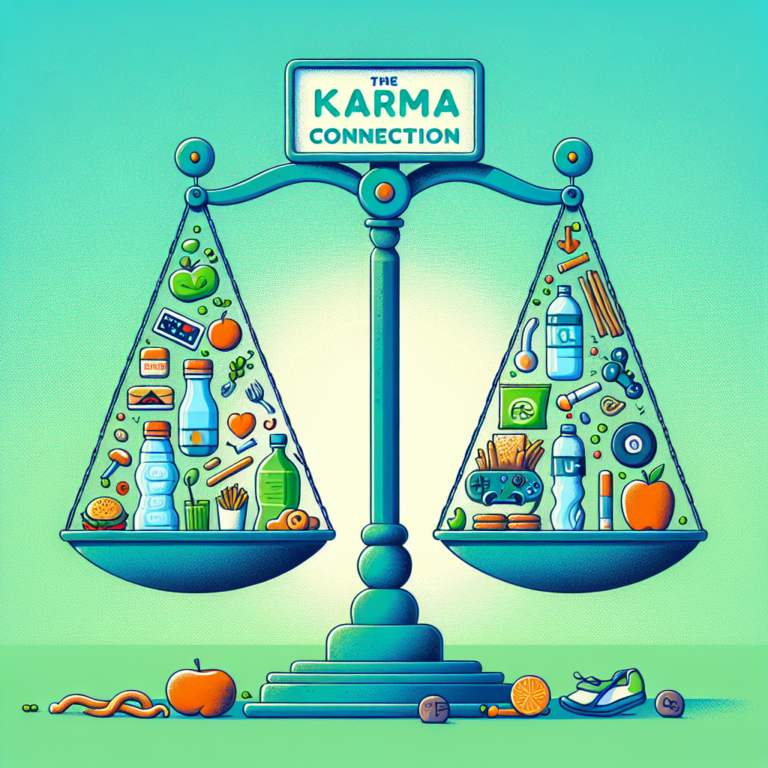The concept of karma has intrigued humanity for centuries. It is widely understood as the idea that an individual’s actions—whether good or bad—will inevitably influence their future experiences. While karma has its roots in the ancient philosophies of Hinduism and Buddhism, it transcends cultural boundaries, appearing in various forms across different societies. At its core, positive karma is about understanding the profound impact of good deeds not only on others but also on ourselves.
The Essence of Positive Karma
Karma operates on a simple yet powerful principle: every action generates a force that will return to the individual. This concept provides a moral framework for understanding one’s role in the grand tapestry of life. When we engage in acts of kindness, generosity, and compassion, we are essentially planting seeds that will flourish as positive outcomes in our lives.
Positive karma isn’t merely a metaphysical belief; numerous studies highlight the psychological benefits associated with altruistic behavior. Good deeds foster a sense of connection and fulfillment, contributing to overall mental, physical, and emotional well-being. The sheer act of helping others engenders positivity, creating a ripple effect that enhances both individual lives and the community at large.
The Transformative Nature of Good Deeds
1. Fostering Relationships
When we engage in good deeds, we create bonds with others that are built on trust, respect, and love. Simple acts of kindness—helping a neighbor, volunteering at local shelters, or simply offering a listening ear—go a long way in fostering relationships. As people experience kindness, they, too, are often inspired to pay it forward. This cycle of positivity cultivates a supportive community, resulting in a stronger social fabric.
2. Enhancing Personal Well-Being
Research has shown that engaging in good deeds can lead to significant improvements in mental health. Acts of kindness trigger the release of endorphins, hormones that promote feelings of happiness and reduce stress. Individuals who practice altruism report lower levels of anxiety and depression. The satisfaction derived from helping others contributes to a sense of purpose and fulfillment, providing a positive feedback loop that encourages further acts of goodwill.
3. Improving Physical Health
Interestingly, positive karma and good deeds can even have a profound impact on physical health. Studies indicate that people who engage in volunteer work and community service often have lower blood pressure and a better immune response. The connection between mental well-being and physical health underscores the importance of good deeds; it’s a two-way street where generosity can lead to improved health outcomes.
4. Promoting Personal Growth
The practice of doing good deeds also encourages self-reflection and personal growth. When we take the time to think about how our actions affect others, we cultivate empathy and compassion. This shift in perspective often leads to enhanced emotional intelligence, which can improve many areas of life, from professional interactions to personal relationships. As we develop a deeper understanding of others’ experiences, we become better equipped to navigate the complexities of human connections.
5. Creating a Ripple Effect
One of the most incredible aspects of positive karma is its contagious nature. When one person acts kindly, it inspires others to do the same. This ripple effect can inspire entire communities, altering the landscape of social interactions. Think about times when you witnessed kindness in action—whether in the form of a stranger helping someone in need or a friend going out of their way to brighten someone’s day. Often, such acts inspire us to give back, forming a harmonious cycle of goodwill.
Harnessing Positive Karma in Everyday Life
The beauty of the principle of karma lies in its simplicity. We can integrate the practice of doing good deeds into our daily lives in myriad ways. Here are several practical suggestions:
Daily Acts of Kindness: Challenge yourself to perform at least one act of kindness each day, no matter how small. This could be complimenting a colleague, helping a friend with a task, or simply smiling at a stranger.
Volunteering: Dedicate time to community service, whether it’s feeding the homeless, tutoring students, or participating in environmental clean-ups. Online platforms can help you find opportunities tailored to your interests.
Mindful Listening: Sometimes, the most significant gift you can provide is being present for someone. Practice active listening to show that you value others’ emotions and experiences.
Support Local Businesses: When possible, choose to buy from local businesses. This decision supports your community and the economy, enhancing the well-being of those around you.
- Practice Gratitude: Cultivating an attitude of gratitude can elevate your perspective. Thank people for their contributions in your life, celebrating the interconnectedness of human experiences.
Conclusion
Unlocking the power of positive karma starts with the recognition that our actions hold consequences. By committing to performing good deeds, we can transform not only the lives of those around us but our own as well. Embracing kindness, empathy, and compassion enhances personal well-being, strengthens relationships, and contributes to a healthier, more vibrant community. Let us all make a conscious effort to spread goodwill, creating a world where positivity and kindness flourish.
FAQs
Q1: What is karma?
A: Karma refers to the spiritual principle of cause and effect, where an individual’s actions lead to consequences that affect their future experiences. Positive karma is generated through good deeds and altruistic behavior.
Q2: How can good deeds affect my mental health?
A: Engaging in good deeds releases endorphins and promotes feelings of happiness, leading to reduced anxiety and depression. Altruism fosters a sense of purpose that greatly enhances one’s mental well-being.
Q3: Can doing good deeds improve physical health?
A: Yes, studies show that individuals who participate in community service have lower blood pressure and improved immune responses. The connection between mental and physical health illustrates the comprehensive benefits of good deeds.
Q4: How can I start making good deeds a daily practice?
A: Begin by committing to at least one act of kindness each day. This can include simple actions like offering compliments, volunteering, or being a mindful listener.
Q5: Is positive karma only relevant in specific cultures?
A: While karma has its roots in Hinduism and Buddhism, its principles of reciprocation and moral responsibility resonate across various cultures, emphasizing universal values of kindness and empathy.
It seems like your message got cut off. Could you please provide more details about what you’re looking for? Whether it’s a specific topic you’d like to discuss, a question, or something else, I’m here to help!, #Unlocking #Power #Positive #Karma #Good #Deeds #Transform #Lives, #Unlocking #Power #Positive #Karma #Good #Deeds #Transform #Lives, 1735348688, unlocking-the-power-of-positive-karma-how-good-deeds-transform-lives





